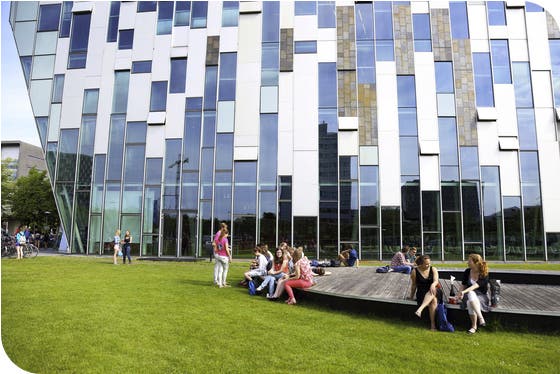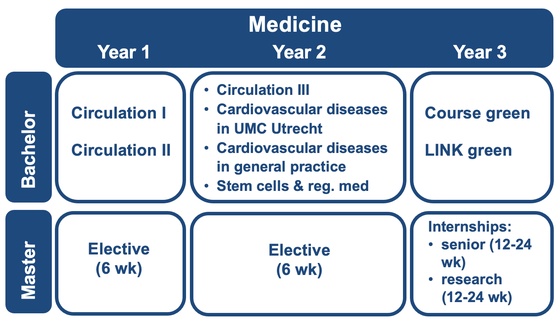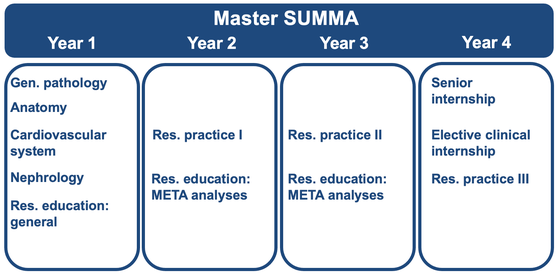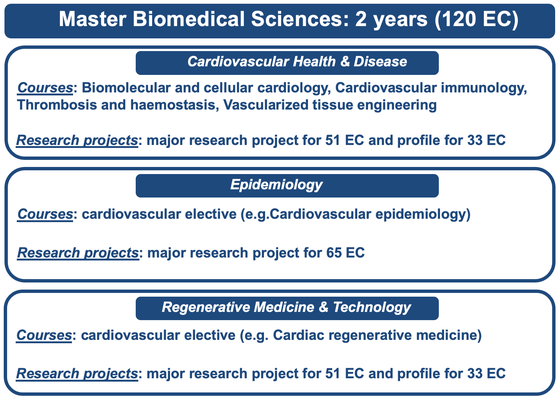Students
Circulatory Health Research Center is closely involved in the education of students of Medicine, Biomedical Sciences and SUMMA. Below, specifics are described per study program.

Medicine
In the Bachelor of Medicine, the courses "Circulation I, II and III" in years 1 and 2 together form the theme Circulation. After following these courses you already know a lot about the structure and functioning of the cardiovascular system and the most common cardiovascular diseases (such as atherosclerosis, heart and brain infarction, heart failure, cardiac arrhythmias). In year 3 of the bachelor you can also learn more about a number of cardiovascular disorders in a practice- and complaint-oriented way in 'Course green' and 'LINK green'. Would you like to learn more about cardiovascular research? Then we recommend that you take the courses ‘Cardiovascular diseases in the UMC Utrecht’, ‘Cardiovascular diseases in general practice’ or ‘Stem cells & regenerative medicine’ in the elective period of bachelor year 2. These courses cover the most recent developments on cardiovascular diseases, such as the use of microRNAs, biomarkers, imaging techniques, genetic screening and stem cells for regenerative purposes.
In the first two years, the master's program in Medicine offers you a total of 12 weeks of elective space for deepening your knowledge or for research. Year 3 of the master gives you the opportunity to follow longer elective clinical or research internships according to interest. Within the Circulatory Health Research Center there is always place for enthusiastic and interested master's students in Medicine to carry out such internships.

SUMMA
For biomedical and life sciences bachelors, the SUMMA in Utrecht is a challenging master's program to become a basic physician ánd clinical researcher. During this program you learn the general skills necessary for scientific research in the line "Research education". In addition, the SUMMA training program pays attention to various medical disciplines, including cardiovascular diseases. For example, blood circulation and the most common circulatory disorders are addressed in different ways in the first year (courses "General Pathology", "Anatomy", "Cardiovascular System" and "Nephrology"). In addition, you will gain clinical experience with cardiovascular patients during various student outpatient clinics under the supervision of medical specialists. If you are interested in cardiovascular research, there are excellent opportunities within the Circulatory Health Research Center for further depth through clinical internships and a research project ("Research Practice") during SUMMA training.

Biomedical education
Bachelor Biomedical Sciences
If you have chosen for the bachelor Biomedical Sciences, you will automatically learn the general skills necessary for setting up, carrying out and describing scientific research. In the course "Research Methods" (year 2), for example, you will be introduced to a full research cycle and the application of statistical methods in experimental biomedical laboratory research. Although this course is aimed at acquiring and applying general scientific skills, there is plenty of opportunity during the bachelor to develop further to your own interests. Have you always wanted to know the specifics of cardiovascular diseases, how they arise or how they can be detected?

In "Medical imaging techniques" (year 1) you can learn about different imaging techniques and their applications. The "Organ Systems" elective course from year 2 provides you with general knowledge about the structure and function of the cardiovascular system and introduces you to a number of cardiovascular diseases. During "Thrombosis, hemostasis and red blood cells" (year 2) the latest developments in hemostasis and thrombosis are discussed. In year 3, various recent aspects of cardiovascular diseases are extensively discussed in the elective courses "Cardiac pathophysiology", "Vascular biology", "Pathology", "Molecular (onco)pathology" and "Regenerative medicine". You can gain experience with cardiovascular research during the "Research project". It is certainly possible to follow a cardiovascular “profile” within the bachelor program according to your own interests.
Master Biomedical Sciences
Through your choice of one of the master's programs from the Biomedical Sciences education you can further develop yourself in the cardiovascular field. For example, if you are interested in the (molecular) basis and treatment of cardiovascular diseases, then the master’s program Cardiovascular Health & Disease is an excellent choice. If you are more into epidemiological approaches to different diseases, then the Epidemiology master's program is an obvious choice. Fascinated by the possibility of repairing failing body parts with stem cells or cultured body cells? Then find out about all the possibilities within the Regenerative Medicine and Technology master's program. Within these three master's programs, there is ample opportunity to further expand your knowledge and expertise in the cardiovascular field by choosing specific courses and research projects. Numerous studies are underway within the Circulatory Health Research Center, both in the clinic and in the laboratory, which make use of expertise from these different research disciplines.

Internships
The UMC Utrecht Circulatory Health Research Center comprises patient care, research and education in the field of cardiovascular disease. Scientific research into cardiovascular disease takes place from different viewing points, using the most modern techniques. Research at the molecular or cellular level, with animal models or patient studies: it all happens. This broad and versatile approach means that the Circulatory Health Research Center has many internship and thesis opportunities for talented (bio)medical students. For example, do you want to help detect cardiovascular disease at an early stage? Then join us in search of new biomarkers or imaging techniques. Or do you want to know why heart patients suddenly develop a heart rhythm disorder? Then help us unravel the mechanism for this. Our internship supervisors will be happy to inform you about what is possible within our program.
For more information you can contact our program office via the email address: circulatoryhelath@umcutrecht.nl
